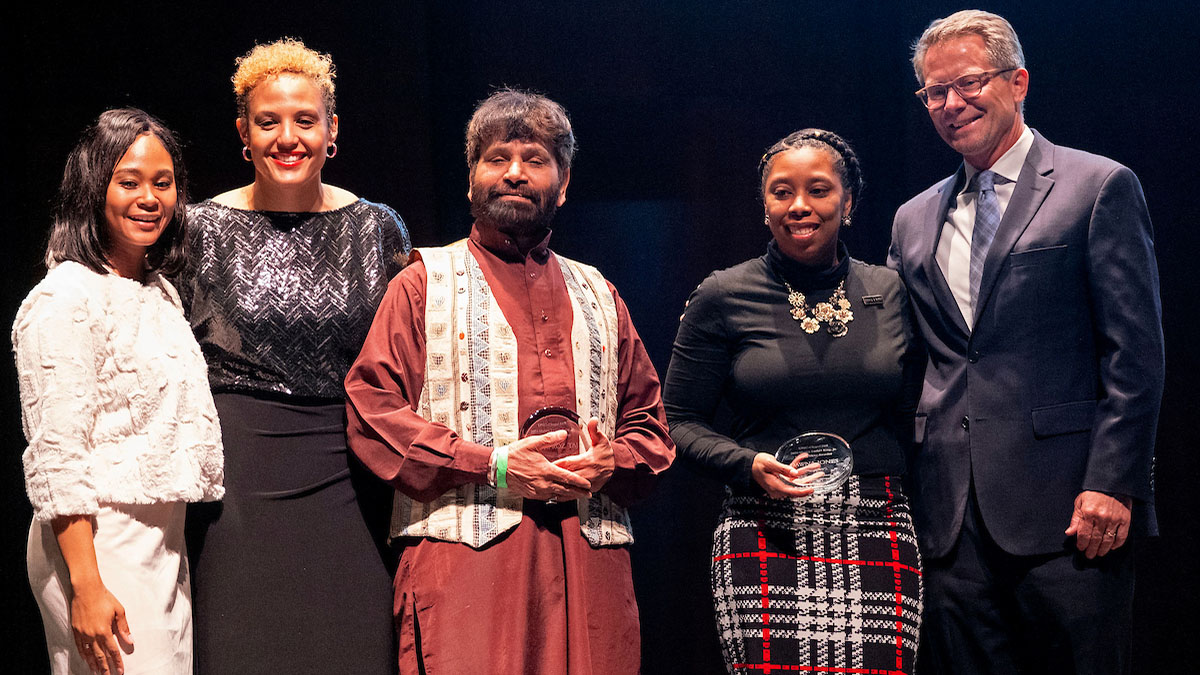Associate professor Afroz Taj of the Asian studies department in the College of Arts & Sciences was the faculty honoree while the staff honoree was Dawna Jones, assistant dean of students and chair of the Carolina Black Caucus.

The University recognized this year’s MLK Unsung Heroes at the annual MLK Lecture and Awards ceremony Jan. 22. Associate professor Afroz Taj of the Asian studies department in the College of Arts & Sciences was the faculty honoree while the staff honoree was Dawna Jones, assistant dean of students and chair of the Carolina Black Caucus.
Afroz Taj, ‘bridging the gaps between diverse communities’
Like the late Martin Luther King Jr., Taj drew inspiration from the life of spiritual and civil rights leader Mahatma Gandhi, who championed an independent, multicultural, multifaith India.
Taj, a 30-year citizen of the United States, grew up in Kasganj, a city in the Mathura region of the north-central Indian state of Uttar Pradesh. Although Mathura is best known as the birthplace of the Hindu deity Krishna, Taj remembers his hometown as a “hodgepodge culture, a beautiful culture,” where Sikhs, Hindus, Muslims and members of other religions lived together in peace.
At an early age he wrote poetry and sang songs about unity in diversity, about how boring a garden would be if it only held one kind of flower. One of his songs, “Naghma-e Aligarh” was adopted by Aligarh Muslim University as the second school anthem: it is an ode to Taj’s undergraduate university celebrating its diversity and progressive values.
“In childhood, you go into some places where naiveness takes you. That naiveness of childhood — I kept it with me as a poet.”
What Taj calls “naiveness,” his fellow Asian studies associate teaching professor John Caldwell sees as a lifelong dedication to inclusion and his reason for nominating Taj for the MLK Unsung Hero Award.
“Especially important for today’s world, on and beyond campus, is his interfaith work,” Caldwell wrote in his nomination, citing the annual field trip to Triangle Sikh, Hindu and Muslim places of worship that Taj has led for the past 20 years, and the six-week immersion-based study abroad UNC Summer in India program he has directed for the past 23 years.
Since coming to Chapel Hill in 1995, Taj has “dedicated his life to inclusion through his teaching, research, service, publicly engaged scholarship and his personal life” and to “bridging the gaps between diverse communities in North Carolina,” Caldwell wrote.

Taj’s academic career is rooted in bridging cultural divides, beginning at the University of Michigan in Ann Arbor, where he taught Hindi and Urdu, two forms of the same language (Hindustani) written in different scripts and the root of a political divide in India. He went on to get his doctorate in poetic drama focusing on Parsi theater, late 19th-century popular adventure-romance plays with music, considered the precursor to Bollywood films.
He was particularly fascinated by “Inder Sabha” or “The Count of Indra,” a play opposed to colonialism veiled in verses about dancing, multicolored fairies. “It smuggled a message to the people while being very popular and very famous,” he said.
Tai came to North Carolina to teach Hindi at three institutions (Carolina, NC State and Duke) via teleconferencing. He earned tenure at NC State, then joined the faculty at Carolina. Here, he has created challenging new courses like Sex and Social Justice in South Asia, designed an innovative program of musical events based on the concept of cultural “confluences” as the first curatorial fellow with Carolina Performing Arts and this spring is organizing a seminar on Islamophobia for the University’s Countering Hate project.
Off campus, Taj sings and recites poetry at charity fundraisers and performs in theatrical productions. For the post 23 years, he has hosted a weekly radio show on 88.1 FM Sunday mornings that features South Asian music and guests who talk about social justice and philanthropic topics and uses a 50,000-member listserv to promote South Asian academic and cultural events in North Carolina.
“In these difficult times, we desperately need professors like Afroz who have long experience and untiring energy to work for truth and justice,” Caldwell wrote. “I have seen him persevere in his struggle to bring opposed communities together, to promote cultural understanding through musical and educational events and to speak out with courage when confronted with bigotry. Overall I cannot think of any member of the UNC faculty who has worked to promote social justice and tolerance in so many different ways, on so many different platforms and across so many different communities.”
Taj said he was “very thrilled” by the honor. “After 38 years, you think nobody’s noticing, but this makes me realize that hard work is recognized,” he said.
Dawna Jones, ‘catalyst for change’
When she thinks of Martin Luther King Jr., two things come to mind for Dawna Jones: activism and activating others.
“He used his words to move people, and that’s one of the things that I hope to be able to do as I move up in my career — to activate them to want to do something,” said Jones, this year’s MLK Unsung Hero staff member. “I think we all have something to bring to the table.”
“Dawna Jones is a visionary, collaborator and unifying force on UNC’s campus” who has “a passion for people and social justice,” wrote Brooke O’Neal, merchant manager in accounting services, one of three colleagues who nominated Jones for the award.
As assistant dean of students and chair of the Carolina Black Caucus, Jones already has two full-time jobs. But she is also teaching a first-year course on thriving at Carolina, serving on the advisory boards of Carolina Firsts, Carolina Cupboard and (W)omxn of Worth, a group that brings together women of color in the staff, faculty and student body. Off campus, she is active in the Chapel Hill-Carrboro NAACP and the Chapel Hill Housing Advisory Board. Oh, and she just started a doctoral program in leadership at North Carolina A&T State University in Greensboro.
“I try to go where I see a need, where I have skills that can support that need. I go where I can be useful, whether that is to be supportive or taking more of an active role,” Jones said. On and off campus, that has meant supporting some of the work around hunger and homelessness, addressing institutional change, supporting affordable housing and protecting the right to vote.
“I feel compelled to always be doing,” Jones said. “Which means that I don’t get a lot of sleep.”
Growing up the youngest of five siblings in East Orange, New Jersey, she was sometimes frustrated as a child when her social worker mother would give away the family’s food or clothing to those less fortunate.
As an adult, she focused on a career in higher education, earning her bachelor’s degree at Penn State University and her first master’s degree in higher education at the University of Pittsburgh. But in her first job in student affairs at West Chester University, she went in search of courses in counseling and wound up with a second master’s degree in social work.
Like her mother, “I found a home in social work. It’s what I’ve been doing my whole life; I just wasn’t calling it that,” she said.
Jones came to work at Carolina in 2013 not knowing anyone here but having a good feeling about the community in general. She still feels that way. “That’s what I love about this community, there are so many caring and giving people here.”
Jones brings that sense of caring to her job in the Dean of Students office and in teaching students how to navigate their first year of college.
“She firmly believes that everyone has the right to pursue a higher education and works tirelessly breaking down barriers that stand in the way of students achieving their degrees,” Maria Erb, co-director of diversity and student success in the Graduate School, wrote in her nomination.
“Jones is a diversity champion whose value for equity supports the University’s institutional commitment to diversity and inclusion. She is a catalyst for change,” Patricia Harris, director of recruitment for the School of Education, wrote in her nominating letter. “Jones challenges UNC to create a community that fosters diversity rather than requires it; she desires to create a space where obligations are met organically rather than through mandate.”
This description fits with Jones’ view of herself as someone more concerned with people than with rules. (“But don’t tell my boss that,” she quipped.) “I got into this work to help people.”
The colleagues who nominated Jones as an Unsung Hero clearly thought her seven years of work helping people here worthy of recognition.
“It’s an honor to have my work recognized in this way,” Jones said. “To have any kind of award that is named for MLK is a huge honor and a lot of responsibility as well.”
Post by Susan Hudson, The Well
